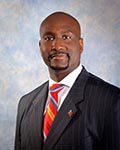Meet Our Deputy Director: Darrin W. Anderson, Sr., PhD
July 2, 2013 | Community News
 In 2009, when the New Jersey YMCA was looking for a state deputy director for its new childhood obesity prevention program office, they wanted an individual with experience in non-profit executive management, statewide advocacy and public policy, and someone who understood the complexities of chronic diseases. Darrin Anderson certainly fit the bill.
In 2009, when the New Jersey YMCA was looking for a state deputy director for its new childhood obesity prevention program office, they wanted an individual with experience in non-profit executive management, statewide advocacy and public policy, and someone who understood the complexities of chronic diseases. Darrin Anderson certainly fit the bill.
As deputy director of New Jersey Partnership for Healthy Kids (NJPHK), Anderson brings an impressive background in non-profit executive leadership, coupled with extensive experience and education in exercise physiology, chronic disease management and public policy. He is responsible for all aspects of NJPHK’s program development and operations, including grant management, partnership development, technical assistance activities, communications and sustainability planning. He also is the associate executive director of the New Jersey YMCA State Alliance, where he is a liaison for the 41 corporate YMCAs, and serves as an adjunct faculty member at Springfield College School of Human Services, which has a historical affiliation with the Y. Additionally, he co-chairs the Regional II Health Equity Council, an offshoot of the National Plan for Action, to eliminate health disparities and health inequity
His life-long interest in health and exercise stems from a family history of chronic disease, including heart disease, diabetes and kidney disease among his parents, grandparents and aunts and uncles. “I saw firsthand the toll that chronic disease can take on a family,” Anderson explained. “I wanted to go in the opposite direction and be an example of healthy living both in my actions and in my education. I wanted to pursue a high quality of life and help persuade others to do the same.”
With NJPHK and the YMCA, Anderson has a platform for not just talking about the impact of a healthy lifestyle on disease, but for helping to implement policy and environmental change in New Jersey schools and communities. In his role, he serves as the driver of the conversation and the conduit for the changes taking place. “Our accomplishments in New Jersey are increasingly receiving wider attention, allowing us to lift up our work from a local and state level to a national level.”
In June, for instance, he hosted a roundtable discussion on childhood obesity and social equity and policy at the 7th Biennial National Childhood Obesity Conference in California. In the spring, he participated in a town hall meeting broadcast on PBS, and spoke about designing healthy communities, and issues of obesity and health related to children, families and community.
Reflecting on NJPHK’s accomplishments, Anderson credits a great team of project managers in the five communities, coupled with the unyielding support of the Robert Wood Johnson Foundation, the YMCA State Alliance, NJPHK’s statewide partners and those in each community.
“NJPHK is a great example of organizations and individuals coming together to provide the leadership and structure to create healthy environments where we live, work and play, and to reverse the childhood obesity epidemic,” Anderson said.
“Each day brings its own challenges, but also the satisfaction of seeing progress being made in our communities from healthier food in corner stores, kids enjoying their school’s salad bar, to parents uniting on issues of wellness. Environmental policy change isn’t something you can touch, taste or feel like a program, but once implemented and adopted, then everyone can experience it. It’s not just about one individual, but about a whole population of people being exposed to the change.”
Early on, Anderson’s focus was on sports and exercise. As a student-athlete and sports enthusiast in high school and college, he wanted to learn more about health and human physiology. He earned a BS in Health, Physical Education & Biological Sciences, but didn’t stop there. He went on to receive an MS in Exercise Physiology (Cardiopulmonary Rehabilitation) from the University of Delaware and a Ph.D. in Kinesiology from Temple University. He has supplemented his formal schooling with training and certifications in non-profit management, leadership, financial development and evaluation.
Anderson started his career as a clinical exercise physiologist in the Health Enhancement and Cardiopulmonary Rehabilitation Program at Eugene DuPont Preventive Medicine & Rehabilitation Institute in Wilmington, Del., and served as clinical director of the Union Hospital’s Cardiopulmonary Rehabilitation Program and Bio-kinetic Testing Laboratory in Elkton, Md.
From clinical care, he moved into administration, where he served as an executive in the non-profit health arena in Delaware, Maryland, Pennsylvania and New Jersey for over 14 years, starting at the American Heart Association as Director of Health Initiatives, Public Advocacy & Policy. In this role, he worked with policy makers to change rules and regulations related to tobacco prevention, diabetes management and stem cell research. He served as resident expert, sharing his knowledge with legislatures about heart disease, physical activity and healthy eating. In Delaware, he was appointed to the Governor’s Council for Lifestyle and Fitness and he chaired the State Health Advisory Council, mainly looking at the integration of healthy eating and physical activity in schools, community and healthcare.
SHARE:
Contact Us: 609-278-9622
Follow Us On: